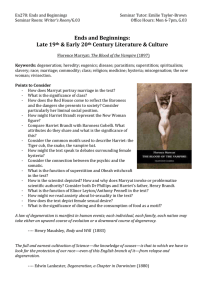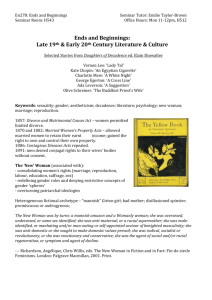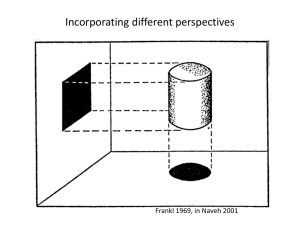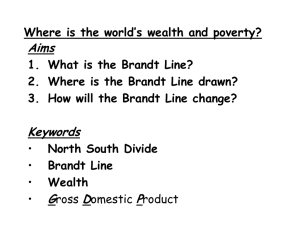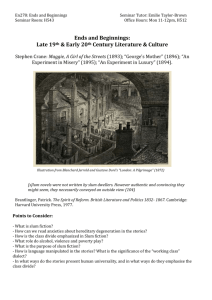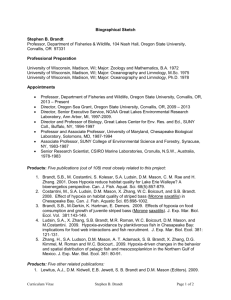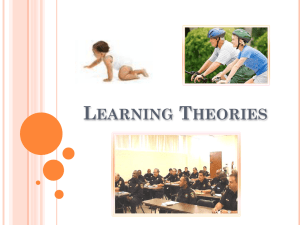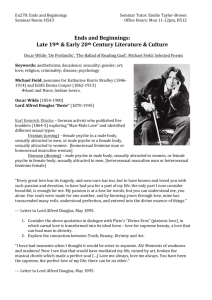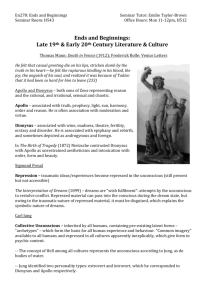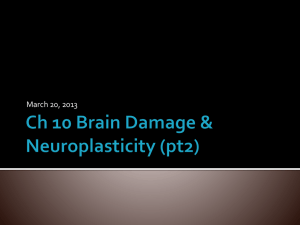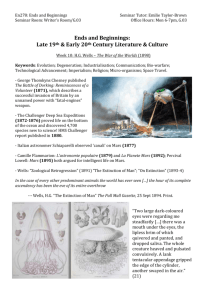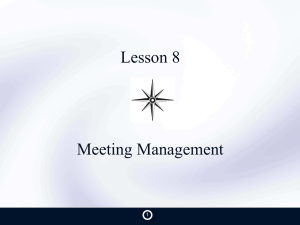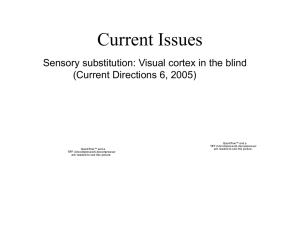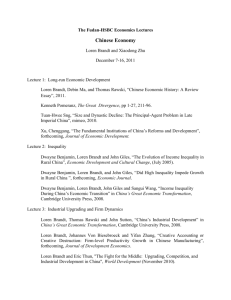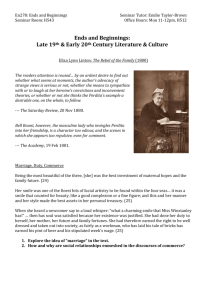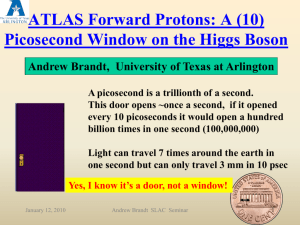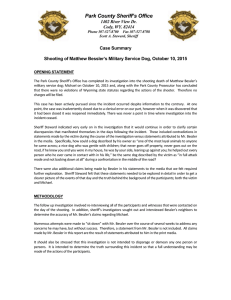Week 7
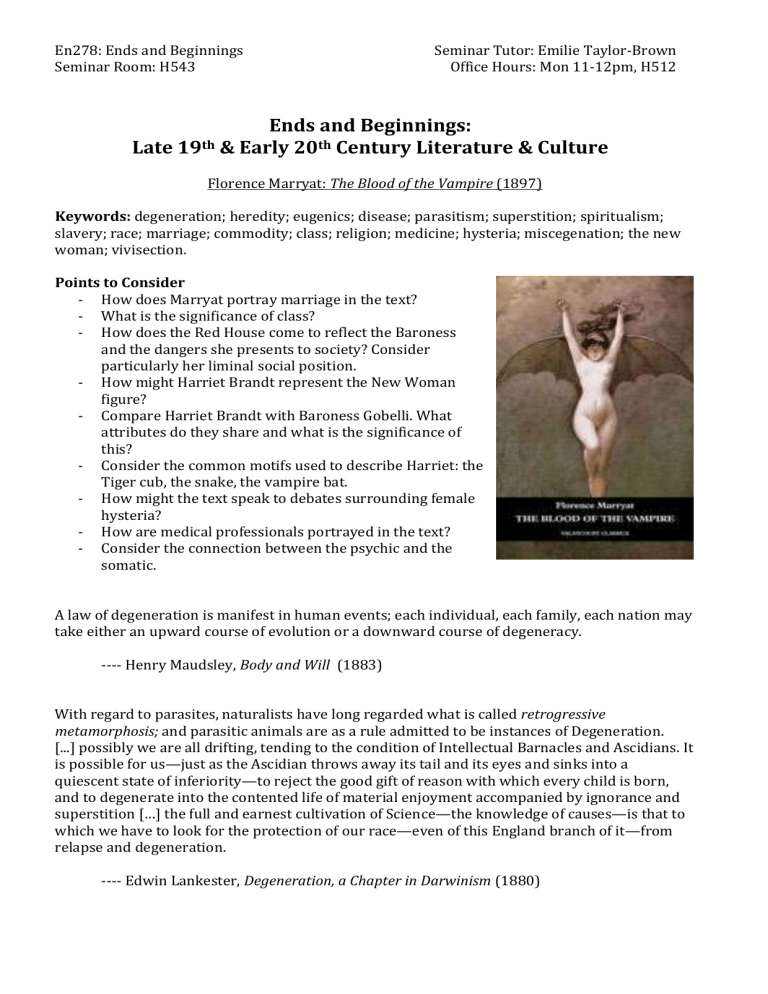
En278: Ends and Beginnings
Seminar Room: H543
Seminar Tutor: Emilie Taylor-Brown
Office Hours: Mon 11-12pm, H512
Ends and Beginnings:
Late 19
th
& Early 20
th
Century Literature & Culture
Florence Marryat: The Blood of the Vampire (1897)
Keywords: degeneration; heredity; eugenics; disease; parasitism; superstition; spiritualism; slavery; race; marriage; commodity; class; religion; medicine; hysteria; miscegenation; the new woman; vivisection.
Points to Consider
How does Marryat portray marriage in the text?
What is the significance of class?
How does the Red House come to reflect the Baroness and the dangers she presents to society? Consider particularly her liminal social position.
How might Harriet Brandt represent the New Woman figure?
Compare Harriet Brandt with Baroness Gobelli. What attributes do they share and what is the significance of this?
Consider the common motifs used to describe Harriet: the
Tiger cub, the snake, the vampire bat.
How might the text speak to debates surrounding female hysteria?
How are medical professionals portrayed in the text?
Consider the connection between the psychic and the somatic.
A law of degeneration is manifest in human events; each individual, each family, each nation may take either an upward course of evolution or a downward course of degeneracy.
---- Henry Maudsley, Body and Will (1883)
With regard to parasites, naturalists have long regarded what is called retrogressive
metamorphosis; and parasitic animals are as a rule admitted to be instances of Degeneration.
[...] possibly we are all drifting, tending to the condition of Intellectual Barnacles and Ascidians. It is possible for us—just as the Ascidian throws away its tail and its eyes and sinks into a quiescent state of inferiority—to reject the good gift of reason with which every child is born, and to degenerate into the contented life of material enjoyment accompanied by ignorance and superstition […] the full and earnest cultivation of Science—the knowledge of causes—is that to which we have to look for the protection of our race—even of this England branch of it—from relapse and degeneration.
---- Edwin Lankester, Degeneration, a Chapter in Darwinism (1880)
En278: Ends and Beginnings
Seminar Room: H543
Seminar Tutor: Emilie Taylor-Brown
Office Hours: Mon 11-12pm, H512
Heredity, Degeneration and Racial Othering
Miss Brandt is a dangerous acquaintance for all of you. We medical men know the consequences of heredity better than outsiders can do. A girl born in such circumstances–bred of sensuality, cruelty, and heartlessness–cannot, in the order of things, be modest, kind, or sympathetic. (70)
“When the cat is black, the kitten is black too! It’s the law of Nature!”
“I don’t believe it! Miss Brandt bears no trace in feature or character of the parentage you ascribe to her!”
“Does she not? Your assertion only proves your ignorance of character or characteristics.
The girl is a quadroon, and she shews it distinctly in her long-shaped eyes with their blue whites and her wide mouth and blood red lips!” (77)
“It would be cowardly to desert a girl just because her father and mother happened to be brutes!
It is not her fault!”
“I quite allow that! Neither is it the fault of the madman that his progenitors had lunacy in their blood, nor of a consumptive that his were strumous. All the same that facts effect the lives of those with whom they come in contact. It is the curse of heredity! (78)
1.
How does the text interact with debates concerning heredity?
2.
How is race pathologised?
3.
How does the text reflect debates concerning miscegenation?
Physiognomy and Parasitism
Don’t speak to me of her mother. She was not a woman she was a fiend, a fitting match for Henry
Brandt! To my mind she was revolting creature. A fat, flabby half-caste who hardly ever moved out of her chair, but sat eating all day long until the power to move had almost left her! I can see her now with her sensual mouth, her greedy eyes, her low forehead and half-formed brain, and her lust for blood. (68)
She felt as if something or someone were drawing all her life away. She tried to disengage herself from the girl’s clasp but Harriet Brandt seemed to come after her like a coiling snake, until she could stand it no longer and faintly exclaim[ed] “Miss Brandt, let go of me please! I feel ill!” (18)
The natures of persons differ very widely. There are some born into this world who nourish those with whom they are associated; they give out their magnetic power and their families, their husbands or wives, children and friends, feel the better for it. There are those, on the other hand, who draw from their neighbours, sometimes making large demands upon their vitality—sapping their physical strength and feeding upon them, as it were, until they are perfectly exhausted and unable to resist disease. (161)
You mustn’t know her, neither must miss Leyton. She comes from a terrible parentage. No good can ever ensue from association with her […] Henry Brandt. You called him a doctor–he was not worthy of the name. He was a scientist perhaps–a murderer certainly! […] Henry Brandt’s barbarity was considered to render him unfit for association with civilised practitioners, and he was expelled with ignominy. (67-8)
En278: Ends and Beginnings
Seminar Room: H543
Seminar Tutor: Emilie Taylor-Brown
Office Hours: Mon 11-12pm, H512
4.
How do Marryat’s descriptions engage with nineteenth century ideas about physiognomy and character?
5.
How does the text interact with debates concerning parasitism and behaviourallyinduced degeneration?
